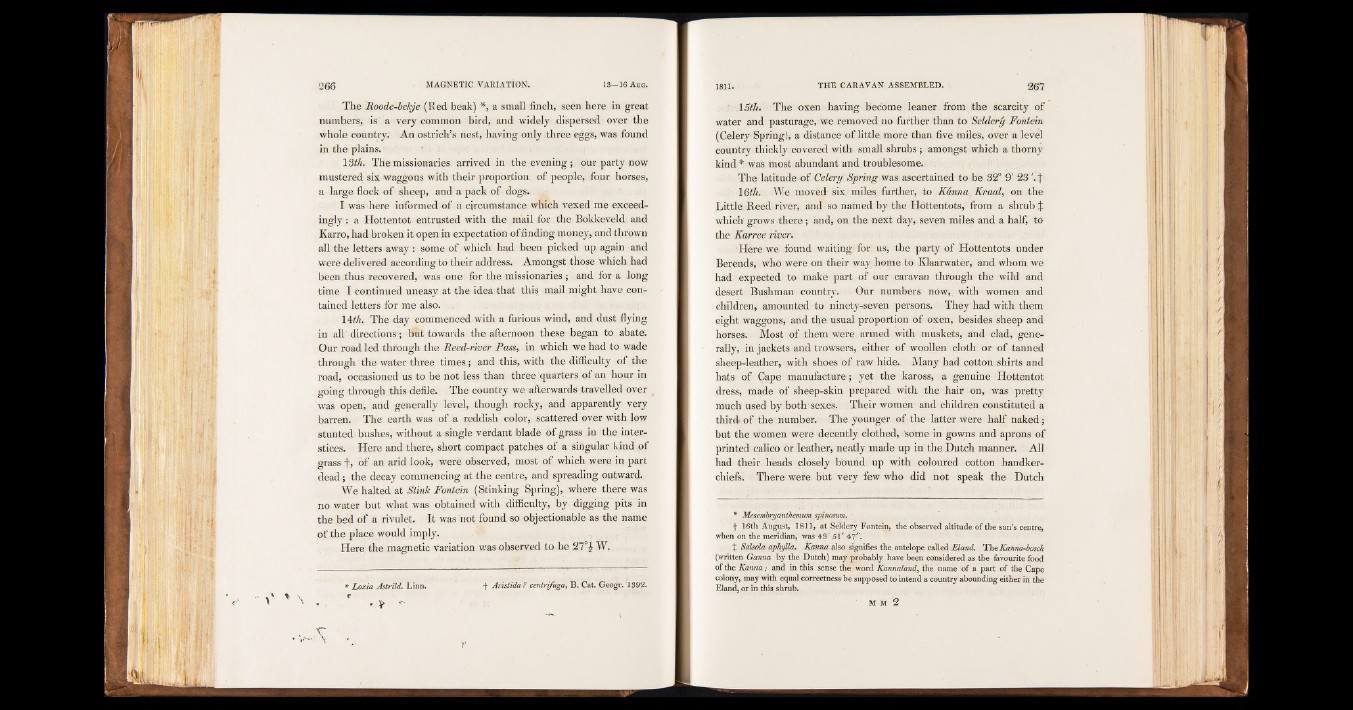
The Roode-bekje (Red beak) *, a small finch, seen here 'in great
numbers, is a very common bird, and widely dispersed over the
whole country. An ostrich’s nest, having only three eggs, was found
in the plains.
: 13th. The missionaries arrived in the evening ; our party now
mustered six waggons with their proportion of people, four horses,
a large flock of sheep, and a pack of dogs.
I was here informed of a circumstance which vexed me exceedingly
: a Hottentot entrusted with the mail for the Bokkeveld and
Karro, had broken it open in expectation of finding money, and thrown
all the letters away : some of which had been picked up again and
were delivered according to their address. Amongst those which had
been.thus recovered, was one. for the missionaries ; and for a Jong
time I continued uneasy at the idea that this mail might have contained
letters for me also. .
14th. The day commenced with a furious wind, and dust flying
in all directions; hut towards the afternoon these began to abate.
Our road led through the Reed-river Pass, in which we had to wade
through the water three times; and this, with the difficulty of the
road, occasioned us to be not less than three quarters of an hour in
going through this defile. The country we afterwards travelled over
was open, and generally level, though rocky, and apparently very
barren. The earth was of a reddish color, scattered over with low
stunted bushes, without a single verdant blade of grass in the interstices.
Here and there, short compact patches of a singular kind of
grass f , of an arid look, were observed, most of which were in part
dead; the decay commencing at the centre, and spreading outward.
We halted at Stink Fontein (Stinking Spring), where there was
no water but what was obtained with difficulty, by digging pits "in
the bed of a rivulet. It was not found so objectionable as the name
of the place would imply.
Here the magnetic variation was observed to be 27°£ W.
* Loxia Astrild. Linn. f Aristida? centrifuga, B. Cat. Geogr. 139?.
■ 15th. The oxen having become leaner from the scarcity of
water and pasturage, we removed no further than to Seldery Fontein
(Celery Spring), a distance of little more than five miles, over a level
country thickly covered with small shrubs; amongst which a thorny
kind* was most abundant and troublesome.
The latitude of Celery Spring was ascertained to be 32° 9' 23 Vf
16th. We moved six miles further, to Kanna Kraal, on the
Little Reed river, and so named by the Hottentots, from a shrub J
which grows there; and, on the next day, seven miles and a half, to
the Karree river.
Here we found waiting for us, the party of Hottentots under
Berends, who were on their way home to Klaarwater, and whom we
had expected to make part of our caravan through the wild and
desert Bushman country. Our numbers now, with women and
children, amounted to ninety-seven persons. They had with them
eight waggons, and the usual proportion of oxen, besides sheep and
horses. Most of them were armed with muskets, and clad, generally,
in jackets and trowsers, either of woollen cloth or of tanned
sheep-leather, with shoes of raw hide. Many had cotton shirts and
hats of Cape manufacture; yet the kaross, a genuine Hottentot
dress, made of sheep-skin prepared with the hair on, was pretty
much used by both sexes. Their women and children constituted a
third* of the number. The younger of the latter were half naked;
but the women were decently clothed, some in gowns and aprons of
printed calico or leather, neatly made up in the Dutch manner. All
had their heads closely bound up with coloured cotton handkerchiefs.
There were but very few who did not speak the Dutch
* Mesembryanthemum spinosum. j
f 16th August, 1811, at Seldery Fontein, the observed altitude of the sun’s centre,
when on the meridian, was 43 51' 47'". •
X Salsola aphylla. Kanna also signifies the antelope called Eland. The Kanna-bosch
(written Ganna by the Dutch) may probably have been considered as the favourite food
of the Kanna; and in this sense the word Kannaland, the name of a part of the Cape
colony, may with equal correctness be supposed to intend a country abounding either in die
Eland, or in this shrub.